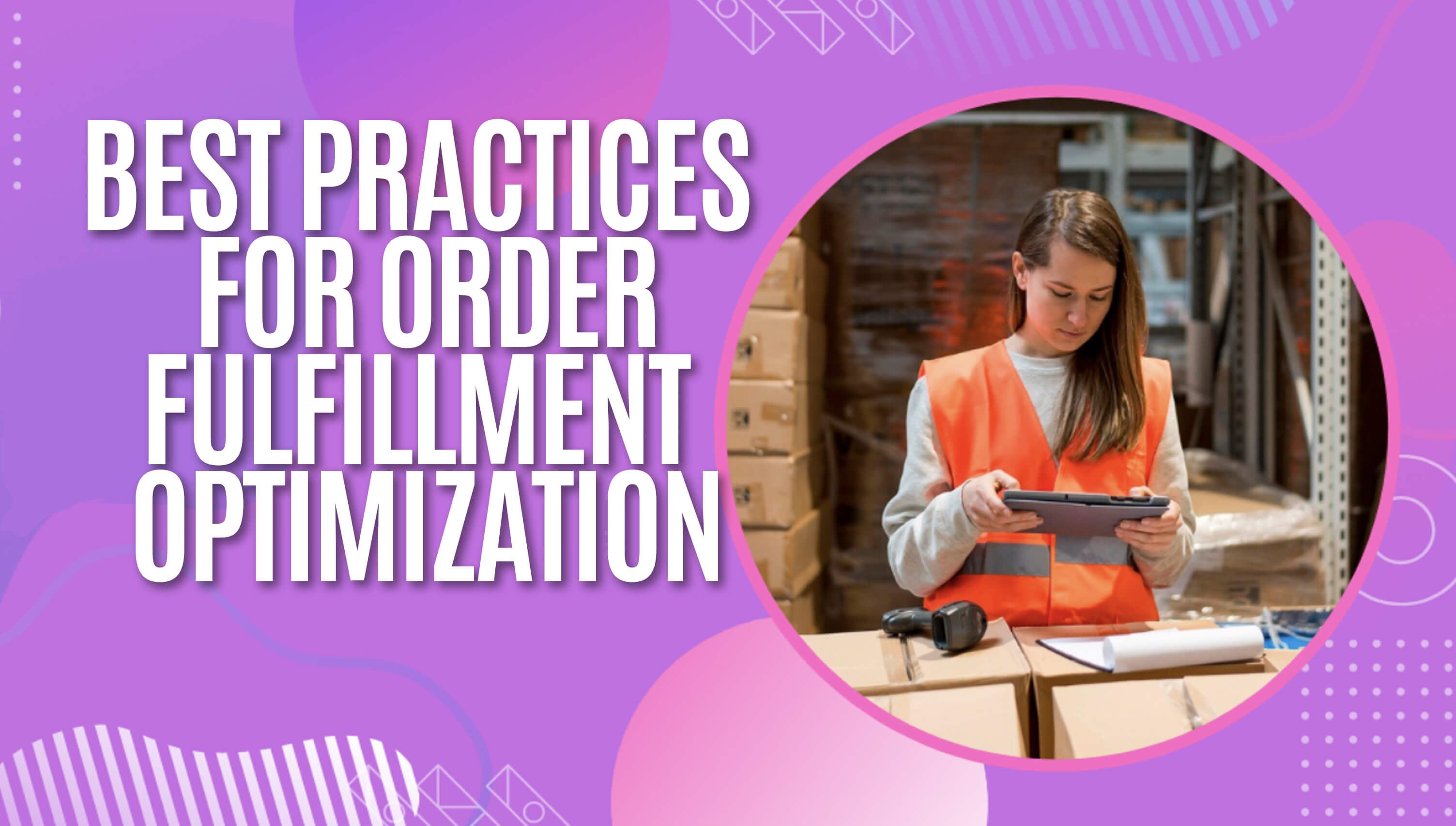
Did you know that 65% of eCommerce businesses use software solutions for order fulfillment?
This statistic alone highlights the pivotal role of efficient fulfillment processes in retaining customers and expanding your business.
Optimizing your order fulfillment process is not just about speeding up delivery; it's creating a seamless, reliable, and adaptable system that evolves with your growing customer base.
From the moment a customer orders to the final delivery, every step should be a well-oiled machine, ensuring order accuracy and timely delivery.
Order fulfillment is a challenging yet rewarding journey. Adopting the right strategies, harnessing the latest fulfillment software, and optimizing your fulfillment network can transform your business from a market player to a market leader.
Let's look into smart ways to manage orders, find cool solutions for sending out products, and handle your stock in a way that keeps everything running smoothly.
All these steps are key to making your customers happy and helping your business stand out in the busy world of online shopping.
Strategies for Optimizing Order Fulfillment
Streamlining Warehouse Operations: Order Fulfillment
By implementing a robust warehouse management system, businesses can significantly enhance their fulfillment operations, ensuring that each customer order is processed efficiently and accurately.
One of the first steps toward streamlining warehouse activities is to embrace the right technology. Fulfillment software, an integral part of any modern warehouse management system, can automate many aspects of the fulfillment operation.
This includes inventory tracking, order-picking strategies, and managing the overall order cycle. Doing so ensures that receiving, stocking, and shipping products are seamless and error-free.
Another vital strategy is to optimize the physical layout of your fulfillment center. This involves organizing inventory to minimize the time taken to fulfill orders.
Efficient order fulfillment speeds up the process and reduces the likelihood of errors, leading to higher order accuracy.
For businesses looking to expand their operations or seeking more specialized facilities, considering to lease a warehouse can be a strategic move.
Leasing provides flexibility and can be a cost-effective solution for many, especially when scaling up fulfillment operations or exploring new options like third-party fulfillment.
Implementing Advanced Inventory Systems:
An advanced inventory system is much more than a tool for tracking stock levels; it's a critical component in refining your overall order management system, directly impacting order fulfillment strategies and efficiency.
Real-time insights into inventory levels are indispensable for effective inventory management, ensuring you always have the right products to meet your customer's order demands.
It also aids in predicting order volume, allowing businesses to make informed decisions about stock replenishment and prevent overstocking or stockouts.
Integrating your inventory system with your order fulfillment service can streamline the process. It ensures seamless communication between different stages of order processing, from receiving an order to the customer's doorstep.
This integration becomes especially crucial when you work with a fulfillment partner or utilize third-party fulfillment providers, enabling them to access up-to-date inventory data and ensure they can efficiently handle order fulfillment on your behalf.
Another key aspect is the ability of advanced inventory systems to offer analytics and insights. These insights can guide you in optimizing your fulfillment model and fulfillment strategies.
For instance, by analyzing past order fulfillment rates and trends, businesses can predict future demands, helping to adjust their inventory levels accordingly.
Leveraging Technology for Automation:
Implementing an advanced order fulfillment system at the heart of this strategy can revolutionize how you handle order fulfillment.
Embracing technology in this realm means moving beyond traditional, in-house fulfillment methods, allowing you to streamline your fulfillment logistics, improve order accuracy, and ultimately enhance customer satisfaction.
Adopting an ecommerce order fulfillment strategy incorporating automation tools — such as order fulfillment software or a third-party fulfillment provider — can drastically reduce order cycle times.
This sales efficiency is not just a boon for your operational workflow; it's a critical step in meeting the increasing demands of your customer base.
By outsourcing fulfillment to a tech-driven fulfillment partner, businesses can focus on core activities, like product development and marketing, while the fulfillment partner manages logistics.
A fulfillment solution that integrates with your ecommerce platform enables real-time tracking and management of the entire order fulfillment process. This integration ensures that every step, from order processing and shipping to handling returns, is optimized for speed and accuracy.
Choosing the right fulfillment partner with robust technological capabilities is not just about managing current demands; it's about preparing your business to grow and expand in an increasingly competitive market.
Moreover, to elevate your order fulfillment strategy further, consider incorporating modern tools that enable you to create QR codes for efficient tracking and management. Implementing QR codes in the fulfillment process can provide an instant link between physical packages and digital data, facilitating seamless monitoring and enhancing transparency at every stage of the order fulfillment journey.
This integration of QR code technology adds an extra layer of precision and responsiveness to your logistics, aligning your business with cutting-edge solutions in the ever-evolving landscape of ecommerce.
Enhancing Shipping and Delivery Processes:
Optimizing order fulfillment is crucial for businesses looking to expand. A key aspect of this is enhancing shipping and delivery processes. Effective strategies in this area not only streamline operations but also significantly improve customer satisfaction.
Adopting advanced tracking systems is essential. These systems provide real-time shipment updates, enabling businesses and customers to monitor the delivery process closely. This transparency builds trust and reduces anxiety associated with waiting for orders.
Businesses should consider implementing flexible shipping options. This includes offering various delivery times and costs catering to different customer needs. For instance, some may prefer paying extra for expedited delivery, while others might opt for slower, more economical options.
Integrating eco-friendly shipping practices can be a game-changer. This appeals to environmentally conscious consumers and aligns with global sustainability trends. By adopting greener practices, businesses contribute to the environment and enhance their brand image.
Developing strong relationships with reliable logistics partners is vital. This ensures that the delivery process is smooth and efficient. A dependable logistics network can drastically reduce delays and errors, increasing customer satisfaction.
Incorporating these strategies into your shipping and delivery processes can significantly aid in managing the increased demand that comes with business expansion.
Best Practices for Order Fulfillment Optimization
Demand Forecasting and Planning:
Optimizing order fulfillment is necessary and pivotal for businesses aiming to grow. The cornerstone of this expansion is effective demand forecasting and planning.
This strategic approach is essential in mastering order fulfillment processes, ensuring you can efficiently meet customer demands while scaling your operations.
Demand forecasting is a critical element in developing the best order fulfillment strategies.
By accurately predicting future customer demands, businesses can tailor their order fulfillment operation to handle increased volume without compromising efficiency or customer satisfaction.
This foresight allows for better resource allocation, minimizing the risks of overstocking or understocking common fulfillment challenges.
Effective planning empowers merchants to align their fulfillment and logistic skills with business objectives.
For instance, a robust plan can include measures to improve your order fulfillment process, such as integrating advanced software solutions or refining warehouse management practices.
This proactive approach addresses current order fulfillment needs and lays a foundation for seamless scalability.
Real-time Order Tracking:
Real-time order tracking is a dynamic component of order fulfillment crucial for the merchant fulfillment side and enhancing customer satisfaction.
By implementing real-time tracking, you enable a transparent fulfillment and logistic operation, allowing customers and businesses to monitor orders from dispatch to delivery.
This practice is integral to the best order fulfillment strategies. It empowers businesses to proactively address fulfillment challenges by providing up-to-date information on every stage of the order fulfillment process.
This level of detail is not just a convenience; it's a necessity in today's fast-paced ecommerce landscape.
For instance, if there's a delay or issue, real-time data can help quickly rectify the situation, ensuring that your order fulfillment activities maintain a high order fill rate.
Real-time tracking is a critical feature that a fulfillment service provider can offer to differentiate themselves in a competitive market. It's a part of efficient order fulfillment processes that contribute significantly to successful order fulfillment.
For businesses looking to master order fulfillment, integrating real-time tracking is not just an option—it's an essential strategy to meet and exceed fulfillment needs and customer expectations.
Effective Communication within the Team:
Effective communication within a team is crucial for mastering the complexities of order fulfillment, a process integral to any expanding business.
The core of successful order fulfillment lies in clear, consistent, and direct communication among team members. This ensures everyone understands their roles and responsibilities in the fulfillment and logistic operation.
When it comes to the best order fulfillment practices, a well-informed team can dramatically improve your order fulfillment process.
Regular meetings, clear guidelines, and open channels for feedback contribute significantly to this goal. In these meetings, discussing common order fulfillment FAQs can proactively address potential issues before they arise.
The importance of communication becomes even more pronounced. The team needs to be agile and well-coordinated to handle omnichannel fulfillment demands, where consistency across various channels is key.
Choosing the right order fulfillment strategies ensures your team is prepared to adapt quickly and efficiently to changes.
Equipping your team with the necessary fulfillment and logistic skills through training and workshops can further enhance their ability to manage an efficient order fulfillment process.
This investment in your team's capabilities is essential in fostering a fulfillment strategy that is responsive and adaptable, making your business ready for growth and expansion.
Quality Control and Returns Management
Quality control is the frontline defense in ensuring customer satisfaction and fostering trust in your brand. It's a pivotal part of successful order fulfillment strategies, particularly when scaling your business.
Implementing rigorous quality checks minimizes the likelihood of errors and defects, directly impacting your order fulfillment operation's efficiency and reputation.
But let's face it: even with the best order fulfillment practices, returns are inevitable in ecommerce. That's where effective returns management comes into play.
Handling returns efficiently and with care is crucial in retaining customer loyalty and maintaining the integrity of your order fulfillment process.
It's not just about taking products back; it's about understanding why returns happen and using those insights to refine your fulfillment strategy for your business.
You create a holistic customer experience by integrating returns management into your order fulfillment needs. This approach ensures that every aspect of the customer's journey, even returns, is handled with the same level of excellence.
Mastering order fulfillment is not just about shipping products; it's also about handling the unexpected with grace and strategic foresight.
This dual focus on quality control and adept returns management lays the groundwork for business expansion through optimized order fulfillment.
Conclusion:
Optimizing order fulfillment is a critical component for businesses aiming to expand successfully.
Streamlining warehouse operations is foundational, allowing for more efficient use of space and resources. Implementing advanced inventory systems balances supply and demand, preventing overstocking and stockouts.
Leveraging technology for automation, such as robotics and AI, further enhances efficiency, reducing human error and accelerating processing times.
Enhancing shipping and delivery processes is equally crucial.
This includes selecting the correct shipping partners and methods to ensure timely delivery, significantly boosting customer satisfaction and loyalty.
On the best practices front, demand forecasting and planning are essential for anticipating customer needs and managing inventory accordingly.
Real-time order tracking not only improves customer experience but also aids in swiftly identifying and addressing logistical challenges.
Effective team communication ensures that all departments are aligned and work cohesively towards common goals.
Quality control and returns management are vital in maintaining high customer service standards, safeguarding the brand's reputation, and encouraging repeat business.
By integrating these strategies and practices, businesses can significantly enhance their order fulfillment processes, increasing efficiency, customer satisfaction, and successful business expansion.



